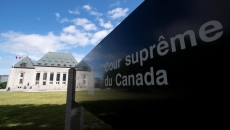A group of Quebec parents has lost the first round of a legal fight to force the province to provide an online learning option for families worried about sending children to school amid the pandemic.
Quebec Superior Court Justice Frederic Bachand refused the parents' request for a safeguard order that would have given parents immediate access to remote courses for their children as the case awaits trial.
In a decision released Tuesday, he wrote that since the parents did not meet the criteria for the emergency order, the case will be decided on its merits at a later date.
The parents are contesting the Education Department's back-to-school plan, which mandates that only children with serious medical conditions or who live with someone at risk of severe complications from COVID-19 can be exempted from physically attending classes.
Human rights lawyer Julius Grey argued on their behalf that forcing parents to send their children to class during a pandemic violates their Charter rights to make fundamental decisions on their lives and security.
He said there is still uncertainty surrounding the health risks of COVID-19, and all parents should have access to online learning resources, as parents in other provinces do.
In his ruling, Bachand said the argument raises valid legal questions.
"In the context of this pandemic, deciding to make it compulsory to attend school in person amounts to taking a position, in the light of scientific knowledge which is limited — in some respects at least — on the acceptable level of risk for the health of the targeted pupils and that of their relatives," he wrote.
"This finding is relevant for the purposes of the analysis of a possible infringement of the right to personal liberty, since it appears from the case law of the Supreme Court that decisions having an impact on the bodily integrity of individuals are part of these fundamental choices covered by this right."
However, to obtain the safeguard, the plaintiffs would have to prove that refusing to grant the order would lead to greater consequences, or inconveniences, than changing it.
In this case, Bachand said the parents failed to prove that the province's back-to-school plan fails to serve the public interest.
He noted arguments cited by experts representing the government, who said the benefits of attending school outweighs what the experts have described as a low risk of COVID-19 complications.
Those experts argued that school provides important structure and socialization, that not all children respond well to online learning and that children with learning difficulties or troubled home lives are likely to be most affected if they're kept home.
Bachand noted that courts generally presume that laws are created in the public's best interest, meaning the burden is on the plaintiffs to prove the contrary.
"In short, because in its current state the file does not contain enough elements of proof to refute the presumption that the government's back-to-school plan adequately serves the public interest, we must conclude the plaintiffs did not discharge their burden of showing that the balance of convenience favoured their position," he wrote.
"Their request for a safeguard order must therefore be dismissed."






